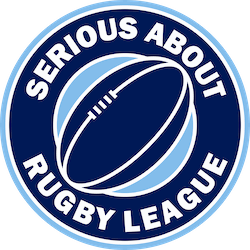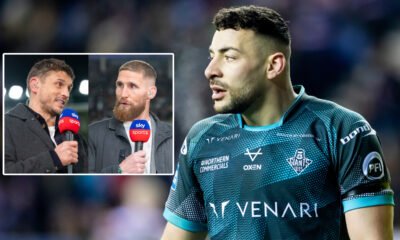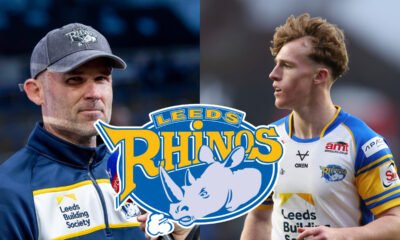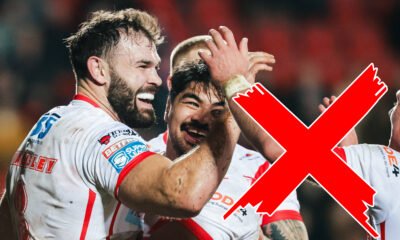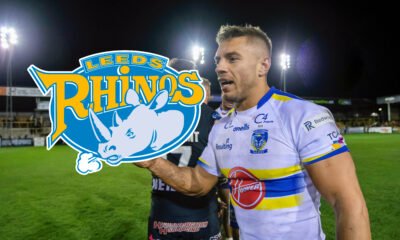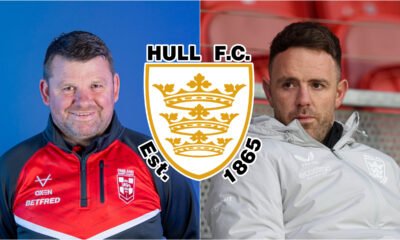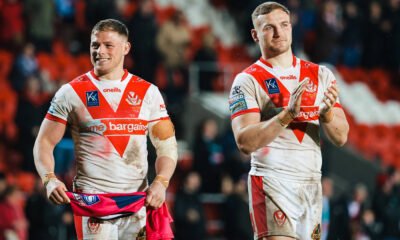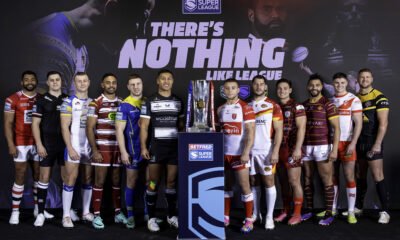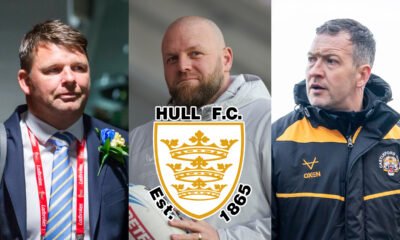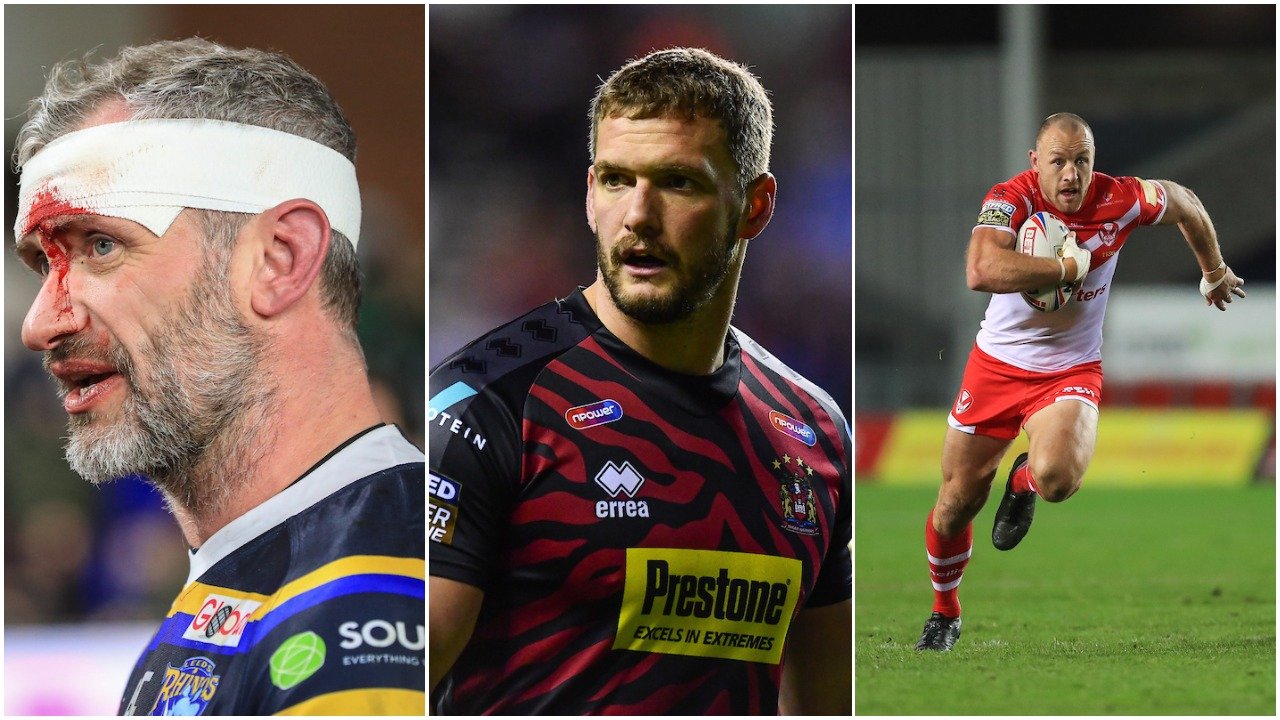
Over the last two weeks we have revealed every Super League clubs five greatest players of the summer era.
Below is the complete team-by-team list…
Castleford Tigers
Adrian Vowles
Australian Adrian Vowles moved to the Jungle ahead of the 1997 Super League season after being shown the door by North Queensland: it was a match made in heaven. Though it took a season to settle in, Vowles became one of Castleford’s most impressive imports, being named the Man of Steel in 1999 as well as being included in the Super League Dream Team as the Tigers reached the semi-finals of both the play-offs and the Challenge Cup. In doing so, the loose forward became the first Tigers player and first Queenslander to win the Man of Steel. Returning to the club to play the last three games of the 2003 season, Vowles would also enjoy one more brief spell in 2005 with Castleford winning promotion from the Championship.
Rangi Chase
One of the most talented stars to ever take to a Rugby League field, Rangi Chase appeared in the UK in 2009 as a relative unknown. Well, all that was about to change with the Kiwi taking to Super League like a duck to water. Over the course of five seasons, the halfback scored 47 tries in 129 appearances, securing the Man of Steel in 2011 as the Tigers narrowly missed out on the Challenge Cup Final. Chase became a hero on the terraces at the Jungle, his majestic skill wowing crowds until a move to Salford at the end of 2013 ended a superb spell. Like the prodigal son, the New Zealander returned at the end of 2016 before joining Widnes on-loan in 2017.
Daryl Clark
Coming through the Castleford ranks, Daryl Clark made his debut in 2011 and it was quickly obvious how much of a superstar he was going to be. From that moment on, the hooker became an integral cog in the Castleford wheel, scooping up the Man of Steel in 2014 as the Tigers made it to Wembley. He also made his England debut in the same year. A move to Warrington came about ahead of the 2015 season following just shy of 100 appearances for his hometown club. Since then, he has become one of the most in-form hookers in the competition.
Paul McShane
It’s been a whirlwind of a career for Paul McShane; released by boyhood club Leeds in 2013, the hooker nearly quit full-time rugby during a spell with Wakefield Trinity. But, it was Castleford where the number nine finally realised his potential. Part of a swap-deal that saw Scott Moore go the other way midway through 2015, McShane settled in seamlessly at the Jungle, going from strength-to-strength before being awarded the Man of Steel in 2020. Arguably Castleford’s most important player, the number nine continues to light up the top flight.
Grant Millington
Very few overseas players stay for nearly a decade in the Super League, but Grant Millington is one of them. And, he’s been impeccable in that time for the Tigers. The towering forward joined ahead of the 2012 season and has gone on to make over 200 appearances, three of them at halfback. A rampaging prop that has the ability to throw the ball like a halfback, Millington is now 34 years of age but continues to churn out incredible performances.
Catalans Dragons
Remi Casty
A Dragon from the very beginning, prop forward Remi Casty has seen the highs and lows at the Stade Gilbert Brutus in two spells. His first – which lasted seven years – yielded 188 appearances before a one-year stint at Sydney Roosters ended the magnificent run. Of course, Casty returned in 2015 and helped guide the club to the Challenge Cup heroics in 2018. Just shy of 150 appearances later and the rampaging forward retired at the end of 2020, going down in Catalans folklore as one of their very greatest.
Thomas Bosc
If ever there was a player that summed up the Catalans club it is Thomas Bosc. Like Casty, Bosc was there from the very beginning, yet he spent his whole career in the south of France, becoming an ever-integral figure. From 2006 to 2017 when he retired, the playmaker racked up almost 1,500 points in just shy of 250 games. In doing so, Bosc established himself as the club’s all-time leading points scorer. With a superb management style of play and an incredible kicking and goalkicking game, the winger/fullback-turned-halfback was a revelation.
Scott Dureau
One of the finest halfbacks to grace the French field, Scott Dureau made the move to Catalans ahead of the 2011 season. The rest, they say, is history; the diminutive scrum-half made the Super League Dream Team in 2011 and 2012 as well as scooping up the Albert Goldthorpe Medal in 2012. Despite playing just under 100 games for the Dragons, Dureau registered over 800 points with the combination between him and Bosc proving to be one of the most lethal until the Australian retired at the end of 2015.
Gregory Mounis
The first French captain of Catalans – appointed in 2007 – Gregory Mounis saw all of his professional career out in the south of France. A no-nonsense, explosive loose forward, Mounis played 274 games for the club, scoring 30 tries and even kicking 20 goals in an 11-year career. Named in the Dragons’ Team of the Decade in 2016, the Perpignan native retired at the end of that season.
Steve Menzies
Over 300 appearances in the NRL later and ‘Beaver’ made the move to Bradford ahead of the 2009 season. After two years at Odsal, Menzies moved to Perpignan much to the shock of most of the Rugby League fraternity considering his ripe-old age of 37. But, like a fine wine, the Australian forward seemingly improved as he neared the 40-year-old mark, having a hand in numerous tries with his athleticism and natural technical ability. In fact, Menzies was included in the 2011 Super League Dream Team.
Huddersfield Giants
Danny Brough
Following a colourful start to his Super League career with Hull, Castleford and Wakefield, Danny Brough made the short move to Huddersfield ahead of the 2010 season. It was a match made in heaven as Brough would go on to help the Giants become regular play-off finishers, as well as proving the catalyst for Huddersfield’s League Leaders’ Shield triumph in 2013. The wily halfback won the Man of Steel for his efforts after setting a new Huddersfield record for the most points in a season with 332. Brough spent nine seasons at the John Smith’s Stadium, leaving at the end of 2018 after registering 1,815 points in just under 250 games. The number seven really did transform the Giants on the field with his masterful kicking game and intelligence.
Michael Lawrence
Perhaps one of the most underrated players in the league, Michael Lawrence has spent all of his career at the Giants so far, registering almost 250 appearances and crossing the whitewash 50 times. The forward ran out in a Huddersfield shirt for the first time in 2007, becoming the first player born in the 1990s to make his debut. Aged just 30, Lawrence still has many years left in the game with his peak physical fitness.
Jermaine McGillvary
Making his debut in 2007, Jermaine McGillvary has forever been one of the first names on the Huddersfield teamsheet. In that time, the powerful winger has notched up 176 tries in 262 games, earning a place in the 2015 Super League Dream Team with 27 tries.
Leroy Cudjoe
Like Lawrence and McGillvary, Leroy Cudjoe came through the Huddersfield ranks and has been a cornerstone of the side ever since his debut in 2008. With almost 600 points in 287 games, the fleet-footed centre enjoyed a testimonial in 2018 and, after an injury ravaged few years, was back to his best in 2020.
Eorl Crabtree
A rampaging presence for 16 Rugby League years, Eorl Crabtree will forever be remembered at the John Smith’s Stadium. Adored by Huddersfield fans and mocked by rival supporters, the prop forward made 350 appearances in the claret and gold. Regularly playing at the top of his game, Crabtree earned 14 England caps whilst with the Giants, with his tremendous work rate and passion perhaps deserving more.
Hull KR
Michael Dobson
Perhaps the first on everyone’s list, Michael Dobson became a cult hero at Hull KR during his six-season stay. After impressing for Catalans and Wigan in Super League and then Canberra in the NRL, Dobson moved to KR in 2008. In 2009, the halfback helped the Robins hit fourth in the league in just their third season in the top-flight, being rewarded with a place in that year’s Dream Team. 153 appearances and almost 1,300 points later, the halfback left Craven Park at the end of 2013 after a stellar spell. Arguably KR’s greatest ever Super League player.
Clint Newton
Joining Hull KR ahead of the 2008 season, Clint Newton announced himself instantly on the Super League stage. The rampaging forward made 100 appearances for the Robins, registering 40 tries, but it was his overall play and passion on the field that impressed the fans on the terraces. An ever-present in his three seasons on Humberside, Newton was named in the 2009 Super League Dream Team, excelling in both the front and back row.
Ben Galea
After seven seasons in the NRL with Wests Tigers and one Grand Final winning medal, Ben Galea hit the coast of Humberside ahead of the 2008 season. The back-rower spent five seasons at Craven Park, registering 36 tries in 126 appearances and earning a Super League Dream Team place in 2009. A brilliant enforcer on the field, Galea operated like a man on a mission and he is still held in very high regard at the club.
Albert Kelly
Despite spending just two seasons at Hull KR before making the move across the pond to fierce rivals FC, Albert Kelly was one of the most creative players to take the field for the Robins since Super League began. With an eye for a gap like few possess, Kelly crossed the line 23 times in 43 appearances and, despite off-field issues springing up, the halfback lit up the Super League in his spell at Rovers.
Josh Hodgson
Despite starting his career on the west side of Hull, it was in the east where Josh Hodgson firmly left his mark. Having been given a chance by Justin Morgan in 2010, the number nine went from strength-to-strength, racking up 134 appearances in five seasons. Hodgson impressed so much that he earned a deal with NRL side Canberra Raiders where he has been since departing KR at the end of 2014.
Hull FC
Kirk Yeaman
Mr. Hull FC himself, Kirk Yeaman made his debut in 2001 before retiring in 2017. The centre even came out of retirement in 2018 to play one game as the club suffered a mounting injury list. After 374 games with 177 tries over the course of 17 seasons, Yeaman broke a number of records. He came the first player ever to win the Challenge Cup twice with his hometown club – in 2005 and 2016. And, he was part of the squad that set a club record 13 consecutive Super League wins in 2006 to reach the Grand Final. If those accolades weren’t enough, Yeaman holds the record for most tries in competitive Hull derbies – 17.
Paul Cooke
Though a later move to Hull KR in 2007 would ruin the reputation he forged amongst the terraces at Hull FC, Paul Cooke was still a major influence during his eight-year spell with the Airlie Birds. Whether with the boot or hands, the playmaker could create something out of nothing as illustrated in the 2005 Challenge Cup Final when he sauntered through the Leeds defence to win the game for the black-and-whites. In 220 games, he registered almost 900 points, earning international honours with England in the process.
Richard Horne
Cooke’s halfback partner in that infamous cup win was this man, Richard Horne. With over 400 career games under his belt spanning 16 years, halfback Horne equalled the club record of scoring in 11 consecutive matches in 2006 – a record which spanned nearly 100 years. A master tactician with a passing game that often changed the outcome of matches, the playmaker was almost forced to retire in 2008 with a severe neck injury. As tough as he was clever, Horne returned to play another six seasons before retiring in 2014.
Gareth Ellis
Hull’s free-spending nature in the past decade has seen some unbelievable stars join the club, but none have perhaps been more influential than Gareth Ellis. Signed from Wests Tigers ahead of the 2013 season, the forward proved just why so many teams were chasing him on his return to the UK. He captained FC to back-to-back Challenge Cup success in 2016 and 2017 and even came out of retirement in 2019 as a 38-year-old to help Hull out during an injury crisis. One of the toughest and fittest to ever take to the field, Ellis was ever the ultimate professional, finally hanging up his boots for good in 2020.
Richard Swain
Despite Hull great Danny Houghton being one of the most consistent number nines in the competition, Richard Swain had so much of an impact during his four seasons that he has to make this list. The New Zealand international was an instant hit on Humberside, being one of the key performers in Hull’s 2005 Challenge Cup success with an unbeatable work-rate that laid the platform for Houghton in later years. Having racked up 93 appearances, Swain retired midway through 2007 with a back injury.
Leeds Rhinos
Kevin Sinfield
Who else but Kevin Sinfield? Debuting as a youngster for the Rhinos aged just 16, Sinfield went on to register a remarkable 3,968 points in 521 appearances for Leeds. If the individual achievements aren’t enough then the fact that he became a pivotal figure in the Rhinos’ Golden Era should make you sit up. The playmaker captained Leeds to a remarkable seven Grand Final victories, back-to-back Challenge Cup triumphs, three League Leaders’ Shields and three World Club Challenge successes. Ever the epitome of a professional, Sinfield could arguably be classed as Super League’s greatest ever player.
Jamie Peacock
Hot on the heels of Sinfield is barnstorming forward Jamie Peacock, who joined the club he supported as a boy – Leeds – in 2006. Whilst with the Rhinos, Peacock won six Super League titles, two Challenge Cups and two World Club Challenges and, by 2012, his contribution to the sport had received national attention – he was awarded an MBE that year. Over the course of ten seasons, Peacock registered 26 tries in 272 appearances, one of which included his 500th career appearance in summer 2014.
Rob Burrow
Playing his entire career with the Rhinos, Rob Burrow won every team accolade available. His trophy cabinet boasted seven Super League titles, two Challenge Cups, three World Club Challenges, three League Leaders’ Shields, as well as two Harry Sunderland trophies for two man-of-the-match displays in the Super League Grand Finals of 2007 and 2011. The latter made Burrow the first player to win the Harry Sunderland trophy twice after he received a unanimous vote from all 37 judges. Pontefract-born Burrow also appeared three times in the Super League Dream Team. Operating as either a half-back or hooker, the ‘pocket-rocket’ made 493 appearances for the West Yorkshire outfit, scoring 198 tries and kicking 157 goals and five drop-goals for a total of 1,111 points. A determined and charismatic leader on the field, Burrow continued to defy his 5’5 stature throughout his career.
Danny McGuire
When thinking of maverick Super League halfbacks, the name Danny McGuire is often one of the first names to be spoken. Hailing from Leeds, McGuire debuted for the club in 2001. 2004 saw McGuire win the Rugby League Writers’ Player of the Year as well as earn a place in the Super League Dream Team (he would earn another in 2006) after playing a major role in guiding Leeds to their first title win in 32 years with victory over Bradford in the 2004 Grand Final. McGuire would add another seven Grand Final victories to the one won in 2004 as well as three World Club Challenges and two Challenge Cups to make him one of the most decorated Super League players ever. His influence in big games has been well documented over the years with the halfback winning the Harry Sunderland trophy for two stellar displays in the 2015 and 2017 Grand Finals. Ever the opportunist, McGuire gave teams nightmares with his stunning back-up play and organisational skills.
Kylie Leuluai
Kylie Leuluai moved to England – and more specifically Leeds – ahead of the 2007 season after being a bit-part player in the NRL. Aged 29, the Kiwi enforcer would become one of Leeds’ greatest ever overseas signings. Over the period of nine seasons, the former Manly forward won six Grand Final titles, two World Club Challenges and two Challenge Cups to make him the most successful overseas player in Leeds’ history. Leuluai made an impressive 258 appearances in a Rhinos shirt and scored 22 tries. In every season after 2011, the forward announced that he would retire at the end of that year, only to reverse his plans and continue on into the next season. It was 2015 when Kylie finally hung up his boots after revealing that he had played that season with an irregular heartbeat.
Salford Red Devils
Malcolm Alker
A one-club man, Malcolm Alker spent his whole career at Salford after progressing through the ranks as teenager. He went on to make almost 300 appearances following his debut in 1997. In 2000, Alker was named captain, earning a testimonial in 2006 before being forced to retire in 2010 due to injury.
Michael Dobson
Part of Marwan Koukash’s rebrand of the Red Devils, Michael Dobson arrived at Salford in 2014. Though injury blighted him in 2015, Dobson helped the club stave off relegation in 2016 before helping to guide the Red Devils inside the top eight a year later. Scoring 301 points over a period of three seasons, Dobson returned to Australia after 2017.
Neil Baynes
Signing from Wigan ahead of the 1999 season, Neil Baynes was an ever-present for Salford over the course of five seasons. The rampaging prop forward accrued more than 100 appearances and helped the club earn promotion back to Super League in 2003. Baynes left to join Whitehaven at the end of 2005.
Andy Coley
Having joined from rivals Swinton Lions ahead of the 2001 season, Andy Coley became one of Salford’s most impressive forwards in the noughties, registering nearly 200 appearances. During his six-year stay with Salford, Coley earned an England call-up, starting every Super League game in 2007 before leaving for Wigan at the end of that year.
Stuart Littler
Mr. Salford himself, Stuart Littler came through the academy to make his debut in 1998, making over 300 appearances for the club until he departed for Leigh at the end of 2011. A no-nonsense centre that had the eye for a try, Littler crossed the whitewash 112 times for the then-named City Reds.
St Helens
Paul Wellens
The ever Mr. Reliable, Paul Wellens spent his whole 16-year career with boyhood club St Helens. Over the course of that career, the fullback made almost 500 appearances, scoring 231 tries and kicking 40 goals. After being named Man of Steel as Saints won the treble in 2006, Wellens was made captain in 2011. As skipper, he lifted the Super League title in 2014, adding to his previous four alongside four Challenge Cups and two World Club Challenges.
Jamie Lyon
He was at Saints for just two seasons, but Jamie Lyon’s impact was momentous. Signing from NRL side Parramatta Eels ahead of the 2005 season, the centre settled in seamlessly, winning the Man of Steel in that year with 22 tries and 42 goals. Lyon was critical in Saints’ treble-winning success the following season too, scoring 22 tries and kicking 163 goals in just 32 matches. He returned to the NRL at the end of 2006, but his mark had been well and truly left.
Sean Long
A cult hero in St Helens, Sean Long moved from Widnes midway through the 1997 season, racking up 124 tries and 812 goals over a period of 12 years. A Man of Steel winner in 2000, the halfback claimed four Super League titles, six Challenge Cups and two World Club Challenges in his time at Knowsley Road. Ever the opportunist, Long could change the game in a matter of seconds.
Paul Sculthorpe
Sculthorpe signed for St Helens from Warrington Wolves ahead of the 1998 season and went on to become a club legend. He made over 250 appearances for the club, helping them to four Super League titles, five Challenge Cups and two World Club Challenges. Sculthorpe also won the Man of Steel award back-to-back in 2001 and 2002, becoming the first player to ever do so.
James Roby
One of the greatest to have ever played Super League, James Roby is St Helens through and through. With over 500 career games to his name, the number nine has won three Grand Finals and three Challenge Cups with Saints. Incredibly, Roby has won two Harry Sunderland trophies as well as the Man of Steel in 2007 to etch his name firmly into the club’s folklore.
Wakefield Trinity
Danny Brough
Having steered Castleford to promotion in 2007, Danny Brough left to join rivals Wakefield in 2008. The halfback went on to win the Albert Goldthorpe Medal that year, but stayed for just two seasons. In that time, however, Brough made 57 appearances, scoring 468 points as Trinity had their best-ever Super League season in 2009, finishing fifth with the halfback at the heart of their success. He returned for 2019 and 2020, playing 24 games.
Jason Demetriou
In 2004, Jason Demetriou left Widnes to join Wakefield: it was a match made in heaven. The tough Australian spent seven seasons at Belle Vue, captaining the club for five of those. Having been named at centre in the Super League Dream Team in 2007, Demetriou was short-listed for the Man of Steel. With 75 tries in 188 appearances, the uncompromising utility man left Trinity a hero.
David Solomona
Signing from Parramatta, David Solomona became a cult hero in the three seasons he spent at Wakefield. The rampaging forward registered 26 tries in 76 appearances, but it was his overall devastating ability and tremendous ball-handling skills that earned him a great reputation at Belle Vue.
Jamie Rooney
A tactical talent, Jamie Rooney signed from Featherstone ahead of the 2003 season. He never looked back, registering almost 1,000 points over the course of seven seasons which included 68 tries and 343 goals. At the age of 29, Rooney left for Cumbrian side Barrow in 2009.
Danny Kirmond
Following a successful loan spell in 2010, Danny Kirmond signed for Wakefield in 2012, being named captain midway through that season. Becoming an integral figure in the back-row for Trinity, Kirmond made the Super League Dream Team in 2013. Over 170 appearances and 47 tries later, the Wakefield-born pack man left to join York ahead of the 2021 season.
Warrington Wolves
Lee Briers
The first name on this list just has to be maverick Lee Briers. Signing from St Helens in 1997, halfback Briers underlined his credentials as Warrington’s best Super League players over the course of 16 years. More than 2,500 points and 425 games later, the Welsh international retired in 2013 due to a neck injury having guided the Wolves to three Challenge Cup victories.
Brett Hodgson
A Man of Steel at Huddersfield, Brett Hodgson moved to Warrington ahead of the 2011 season and hit the ground running immediately. 75 games later, the fullback scored 39 tries and kicked 314 goals, helping them to Challenge Cup glory in 2012 as well as the League Leaders’ Shield in 2011. Hodgson was awarded the Lance Todd trophy in the Challenge Cup Final and was also part of the Warrington side that made back-to-back Grand Finals, though they lost both.
Chris Hill
Former Leigh prop, Chris Hill, moved to Warrington ahead of the 2012 season, winning the Challenge Cup in his first season. Having been made captain in 2016, Hill lifted the League Leaders’ Shield in that year as well as the Challenge Cup in 2019. With nearly 300 appearances under his belt, Hill has become an England and Great Britain international during his time at the club.
Ben Westwood
A centre at former club Wakefield, Ben Westwood signed for Warrington in 2002 and made the switch to the second-row in 2005. As tough as they come, yet also fleet-footed, Westwood became a club legend, helping Warrington to lift consecutive Challenge Cups in 2009 and 2010 and another cup success in 2012. He eventually retired at the end of 2019, with over 400 appearances to his name.
Michael Monaghan
Moving from Manly ahead of the 2008 season, Michael Monaghan took to the Warrington club like a duck to water. The hooker was pivotal in the Wolves’ back-to-back cup successes in 2009 and 2010, winning the Lance Todd trophy in the former. Monaghan also performed superbly in Warrington’s 2012 Challenge Cup victory also, but was on the receiving end of two Grand Final defeats in 2012 and 2013. He retired at the end of 2014, with 17 tries in 167 appearances.
Wigan Warriors
Kris Radlinski
Having signed for the club as a junior in 1993, Kris Radlinski wrote his name in Wigan folklore over a 12-year period. Before the onset of the Grand Final, the flying fullback won two Premierships – being awarded the Harry Sunderland trophy for a man-of-the-match performance in 1995 – and was on hand to lift the title at Old Trafford in 1998. Winning the Lance Todd trophy in the 2002 Challenge Cup Final too, Radlinski did, however, have to sit through three Grand Final losses. 183 tries in over 300 appearances later and Wiganer Radlinski retired – though he did make an additional six appearances in 2006 to help the Warriors avoid relegation.
Andrew Farrell
Few players have had an impact that rivals that of Andy Farrell during his time at Wigan. A Wigan academy product, by the time Super League came into fruition, Farrell was already captain and Man of Steel. That stellar form continued in the summer game with the loose-forward breaking the record for most points in a season with 429 in 2001. Being named Man of Steel for a second time in 2004, Farrell also scooped up the Golden Boot and Forward of the Year by the RLIF. All in all, the incredible number 13 scored over 3,000 points in all competitions for the Warriors and is second on England’s all-time top points scorers list.
Sean O’Loughlin
The number 13 role has been in safe hands for Wigan from before the turn of the millennium with Sean O’Loughlin taking over from Farrell with the latter’s move to rugby union. O’Loughlin played his entire club career with the Warriors, from 2002 right though to 2020 when he retired with over 450 appearances to his name. Four Grand Finals, two Challenge Cups and one World Club Challenge later and the now 38-year-old is classed as a club legend at the DW Stadium.
Pat Richards
Have Wigan had an overseas signing as much loved as Pat Richards in the modern game? Probably not and here’s why; the rangy winger joined in 2006 and left at the end of 2013, with almost 2,500 points and nearly 250 appearances later. In that time, Richards won the 2010 and 2013 Super League Grand Finals as well as the 2011 Challenge Cup. Individually, however, his achievements were incredible; he was awarded the Man of Steel in 2010 and became the highest overseas points-scorer in the competition’s history.
Tommy Leuluai
One man that could rival Pat Richards for a favourite adopted Wiganer is Tommy Leuluai. Signing from Harlequins RL ahead of the 2007 season, the halfback became an instant hit in Lancashire, helping to steer Wigan to a Grand Final victory in 2010 and then a Challenge Cup success a year later. Though the Kiwi left to join New Zealand Warriors in 2013, Leuluai returned in 2017 like the prodigal son, winning a second Super League title in 2018. He is still a major star in the Warriors side.
